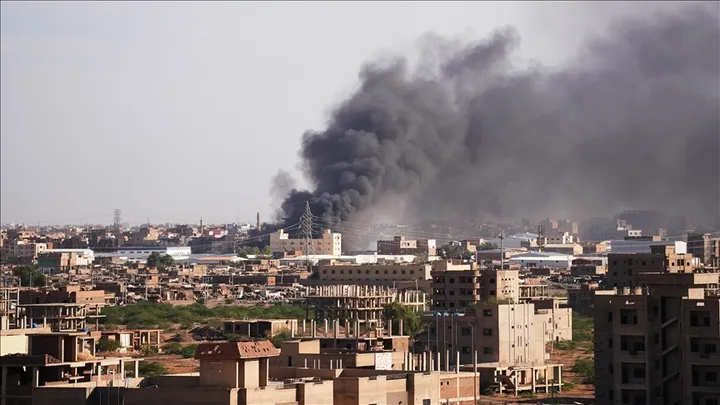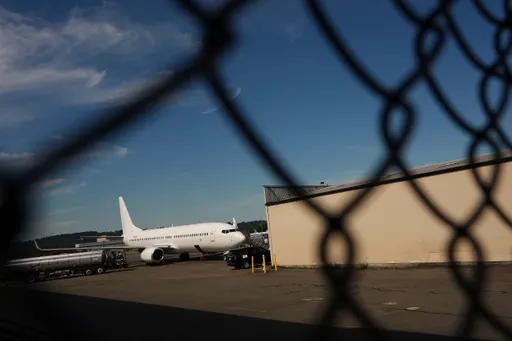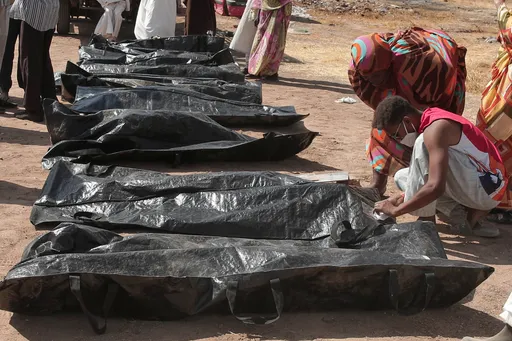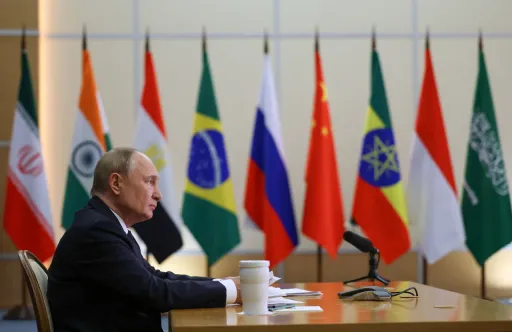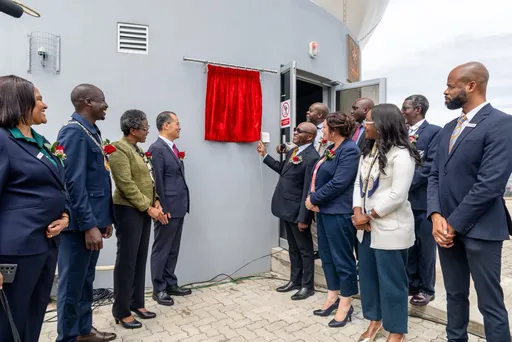By Mazhun Idris
Outgoing Nigerian president Muhammadu Buhari was elected in 2015 in unprecedented circumstances with massive support and rare level of popularity defeating then-incumbent Goodluck Jonthan of the ruling Peoples’ Democratic Party.
As the candidate of the All Progressives Congress (APC) party, Buhari became the first opposition politician to defeat an incumbent in a presidential election in Nigeria. He promised to tackle insecurity, fight corruption and improve the economy.
At the time, one of the major concerns of Nigerians and the international community was Boko Haram's violence which was rapidly worsening with the insurgent group capturing and controlling swathes of Nigerian territory and its fighters carrying out almost daily bombings, gun attacks and kidnappings.
Military boost
As president Buhari steps down after eight years in power, his government boasts of recapturing areas previously controlled by Boko Haram and that it has ‘’degraded’’ the armed group and its offshoot known as ISWAP.
The conflict which started in 2009 has led to the deaths of about 350,000 people – directly and indirectly – according to the UN.
Speaking at the inauguration of a counterterrorism centre in March, President Buhari said success in the fight against Boko Haram and other armed groups ‘’was largely achieved through the valiant efforts’’ of the Nigerian security forces in collaboration with regional and international partners as well as ‘’the support and cooperation of the Nigerian citizens.’’
A lack of proper military equipment had been one of the major challenges in the fight against Boko Haram. But Buhari’s government says it acquired more weapons including 38 aircraft for the Nigerian Air Force.
‘’Nigeria’s success in acquiring weapons has helped in fighting the insurgency,’’ a Nigerian lawyer, Idris Bawa told TRT Afrika.
Although, Boko Haram has been degraded, armed gangs kidnapping people for ransom became stronger especially in the northwest of the country abducting travelers on highways, students from schools and residents in rural communities with thousands of people falling victims in the past three years.
But outgoing president Muhammadu Buhari who is a former army general, said progress was also being made in tackling the kidnapping gangs locally referred to as ‘bandits.’
Although Nigeria’s oil-dependent economy has faced difficulties with the value of the currency crashing and inflation rising, his administration says it has succeeded in its efforts to reduce poverty, boost agriculture and improve power supply.
Oil reforms
The government blamed some of the economic challenges on sharp falls in international oil prices and the devastating global impact of the Covid-19 pandemic. It says the economy was back on track to recovery despite slow GDP growth.
Under Buhari's administration, Nigeria has seen relative peace in the oil-producing Niger-Delta region where militants seeking a greater share of the oil wealth usually attack oil facilities, steal crude and kidnap oil workers. Oil wells were also commissioned in the north of the country for the first time in the history of the region.
The Buhari administration has also enacted a landmark law overhauling the country’s oil sector in 2021. The Petroleum Industry Act encourages more private investments in the sector and greater share of oil revenues to oil-producing communities.
Mr Buhari said the country had lost more than $50 billion in potential investments in the past ten years due to delays in making the legislation by previous governments.
As a result of the law, the state-owned oil company, the Nigerian National Petroleum Corporation, has now been converted into a limited liability company to attract more private sector investments.
The move has been hailed by many including Babatunde Azeez, a petrol station manager in the commercial city of Lagos.
Mr Azeez however, said he was not satisfied with some other economic policies including the closure of Nigeria’s land borders for several months between 2019 and 2020 which he says had affected citizens especially those trading along the borders.
“We might excuse the government due to global crises such as Covid-19, recessions, and the impact of Russia-Ukraine war. But we cannot excuse it in the light of some policies, such as border closure,” he told TRT Afrika.
However, the government said shutting the border had helped in tackling insecurity by curbing importation of illegal drugs and arms.
It also said in helped in boosting local production of food because food imports were cut and local farmers were encouraged and supported.
Another legacy of President Buhari’s government is the revival of rail transportation in the country including from the capital Abuja to the northern city of Kaduna, from the commercial city of Lagos to Ibadan in the southwest region and from Itakpe to Warri in the oil-producing Niger-Delta region.
“President Buhari’s rail reactivation made life easier for travelers,’’ says Ibrahim Halilu Abubakar, who travels regularly by train between Kaduna and Abuja since the railway became operational in 2016.
Abubakar told TRT Afrika that although gunmen had attacked a passenger train kidnapping dozens of people last year, for most part, ‘’the trains gave us succour when road travel was the riskiest option’’ because of frequent kidnappings on the roads.
Clear danger of corruption
The government also boasts of massive construction of roads, bridges and improvements of sea ports and airports as well as health and power sectors. In the area of education, it had increased the number of universities in the country from 122 to 228 – the highest ever increase.
The government also says that it has been able to boost the enrolment of children into basic schools.
But the country saw one the longest strikes by university lecturers in its history leaving about two million students stranded as the institutions were closed for eight months in 2022.
Members of the Academic Staff Union of Universities embarked on the industrial action to demand better working conditions and more funding for universities.
When President Buhari was elected one of his key statements was: ‘’If we do not kill corruption, corruption will kill Nigeria.’’
This was part of his promise to fight endemic corruption which he said ‘’poses a clear danger to Nigeria.’’
Justice Minister Abubakar Malami was quoted by local media in November last year as saying that since 2015, the government had recovered about $1 billion of stolen funds as part of its anti-corruption efforts.
Several high profile politicians including senators and former state governors were jailed for corruption in an uncommon stride in the country.
But the pardoning and subsequent release of two jailed former state governors, Joshua Dariye of Plateau state and Jolly Nyame of Taraba state, had been widely criticised by anti-corruption campaigners who said the move had cast a shadow on the fight against corruption.
The government defended its decision saying the politicians were released because of their health conditions.
The decision “was a culmination of a rigorous process, regulated and guided by the law which was not, in any way designed to achieve a political purpose,” Buhari’s spokesperson, Garba Shehu had said in statement following a public outcry.
Buhari’s government has reformed and strengthened the country’s anti-corruption laws to facilitate the seizure of funds and assets linked to corruption at home and abroad and tackling internet fraud.
The Central Bank of Nigeria in February started the implementation of a policy introducing redesigned currency notes and phasing out existing ones aimed at reducing corruption, inflation and insecurity.
But many Nigerians including petrol station manager, Babatunde Azeez faulted the move because it caused acute shortages of cash in circulation before it was subsequently suspended following a Supreme Court ruling.
Another important legislation signed by President Buhari was the Discrimination against Persons with Disabilities (Prohibition) Act, 2018, which gives people with disability greater rights and freedom in terms of job opportunities and fighting discrimination in public life.
Self-assessment and apology
Nigerian lawyer Idris Bawa, says such reforms were crucial for the country to move forward. He also cited reforms carried out to improve justice system and police affairs following street protests in 2020 against alleged police brutality widely known as the EndSARS protests.
Bawa said Buhari’s government had done well in this regard because for decades, ‘’we have not had such police reforms.’’
In a televised address a day before his tenure expired, Muhammadu Buhari scored his administration high in the areas of ''revamping the economy,'' tackling insecurity, fighting corruption, consolidating democracy and infrastructural development as well as boosting Nigeria's image and influence internationally.
Despite criticisms against his government, the outgoing Nigerian leader said: ''I am confident that I am leaving office with Nigeria better in 2023 than in 2015.''
He however ''sincerely apologised'' to Nigerians due to what he called ''temporary pain and suffering'' caused by some of his government's economic policies which he described as ''difficult choices.''
But he pointed out that those ''measures were taken for the over-all good of the country.'' Most of the policies ''yielded the desired results,'' the outgoing president added.
Mr Buhari wished his successor Bola Ahmed Tinubu well and expressed confidence that the new president who comes from his APC party will lead Nigeria to a ''higher'' level.



